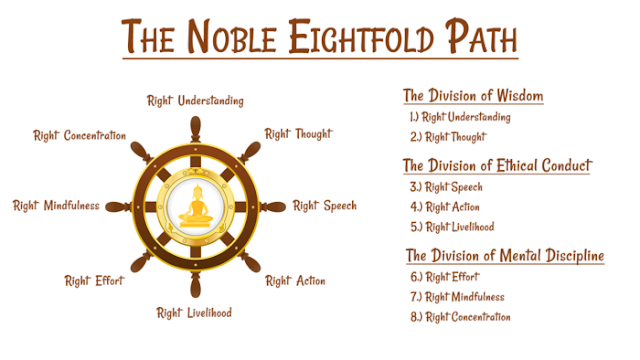As we continue out look at how closely aligned the Nobel Eightfold Path is with the Five Virtues of Hekate, today we're looking at Right Effort.
What is Right Effort?
Right effort is often overlooked in a lot of Buddhist teachings due to how connected effort can be with ego. In early traditions the whole idea of the path is to be sure that your effort is moving your forward.
One of the four aspects of Buddhism is to strive for continued positive states of mind. We may get angry or greedy and this effort is to stop those things prior to becoming in that state. We understand we're not awakened yet, we can be led to do unskillful things or be in an unskillful state. We should guard against that by taking the effort not to put ourselves into situations that cause us to create suffering. We should be striving for the skilled states, Loving Kindness, Compassion, Sympathetic Joy, Wisdom and Equanimity are examples of this.
Right away we see that several of the Five Virtues are here. Compassion, Wisdom are most prominent but we can also see the remaining virtues within the skilled states. Justice can easily fit into Equanimity, along with courage. Temperance can fit with kindness and sympathetic joy. We have to reminder that all of these skills, paths or virtues are all about balance.
Our effort should always be in the right direction or in the direction of easing suffering. Easing suffering for ourselves and for others. For some it may mean downsizing your living space or making donations to a local charity. I may also include limiting your exposure to those things that cause you to become frustrated or angry. The idea is to ease suffering. The idea behind the Five Virtues is to walk a path of strength, positive action and positive mind while exploring our world.
Working with Compassion, I think this is one of most aligned pieces of our path so far. Within us we should treat all living beings with compassion. This includes ourself. We should look to live in a way eases suffering. To me, this includes how I engage with other people. How I prepare my food and even how I write these posts. I'm careful to share what my thoughts are without passing judgement on how other people may feel.
An example of this is a recent discussion in a Facebook group where they were discussing offerings to Hecate. One wanted to know if chicken fingers were ok to put on their altar. When another replied with the traditional offerings and asked why the person chose chicken, they were immediately blocked by the original poster. Today, we seem to lack the ability to engage in conversations that question our actions without feeling attacked. What was the right action here? At first, I wanted to reply and try to mediate the situation. Even if what I was saying was truthful, and kind, was it necessary?
In the end, for me it was not necessary. The effort here would be to "correct" the situation and it really isn't my place to correct anyone. So I left myself out of the conversation. Was this right effort? To me it was, but really there's no real way to judge this. Some may say, it is my place as a Keybearer to the Covenant of Hekate to correct someone when inaccurate information is being shared. In some situations I would agree. Had I been asked for my opinion, I think it may have been welcomed. Even though the poster asked "Can I give Hekate chicken fingers." The real statement was, "I want to give Hekate Chicken Fingers, please reply if you agree with me." We can see this based on the immediate block of the first person to disagree.
So does the step, Right Effort align with the Five Virtues of Hecate? Absolutely! I see it in several. What do you think? Do you see something different? Feel free to share your thoughts in the comments, on the Facebook page or continue to share privately in our chats.
Wishing you and amazing day.
Namaste,
Rev. Renee Sosanna Olson
Keybearer to the Covenant of Hekate
Found of the Sanctuary of Hecate Brimo
Resources:

















No comments
Post a Comment